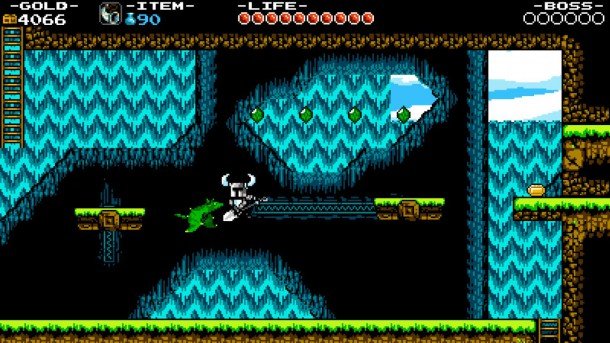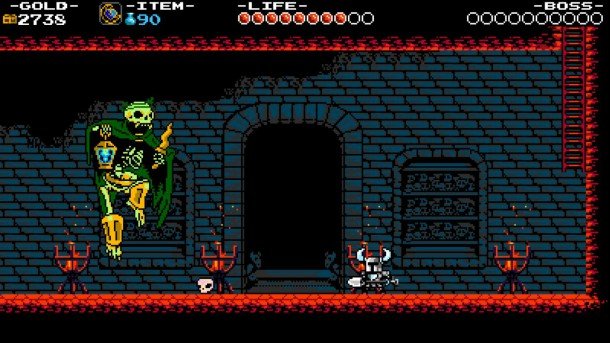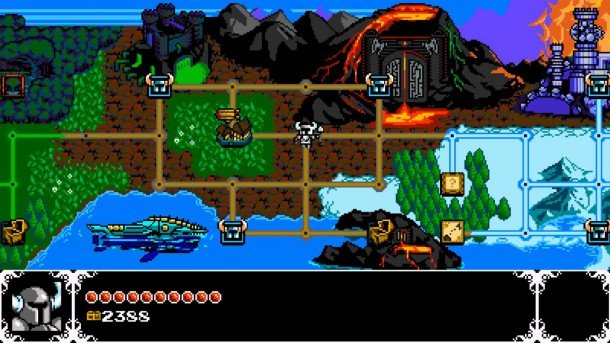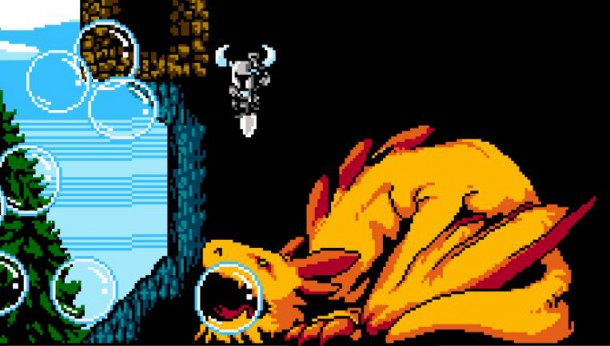Our Verdict
Shovel Knight lovingly recreates the simple pleasures of 8-bit platformers and improves on them with modern ideas that make every level different and worth playing.
PC Gamer's got your back
Are you a 20-40 year old who's desperately clinging to happy childhood memories? Do you think that things used to be better and find yourself saying the phrase “back in my day” a lot? I try to avoid the allure of such nostalgia, but I must admit I loved Shovel Knight, a mostly uncompromising revival of 8-bit platformers.
It evokes the warm fuzzy memories from the era of cartridges and cathode ray tube televisions with excellently composed chiptunes, beautiful character sprites and backgrounds, and pixel-precise controls. It feels like what I remember those games played like, but in reality improves upon them in many ways.
If nothing else, it proves that we weren't crazy to obsess over primitive, two-button games. As the Knight who Shovels, you can jump, shovel, jump and shovel at the same time, or jump and then shovel for a downward, pogo stick-like attack. There're a few other special items, like the phase locket that makes you temporarily invincible, a war horn that deals damage to all the enemies around you, and some other upgrades you pick up along the way. But basically you're just jumping and shoveling throughout, and it never gets tired because every level makes you carefully rethink how to use this minimal moveset.

Enemies require different strategies, there are many secrets and collectibles to find, and the platforming on its own is challenging enough to demand your full attention at every jump. There are also a few clever, subtle ways Shovel Knight keeps you on your toes. I particularly enjoyed a gothic-themed Lich Yard level where the screen would occasionally go dark, leaving me to navigate by the shape of silhouettes, or wait for a lighting strike to illuminate the way for a second before going dark again. It's a cool trick, and it was used sparingly before quickly moving on to other great twists, like a water level that changes the physics of the game, or enemies that can only be killed by shoveling certain objects at them.
Shovel Knight is full of these clever, decidedly modern ideas. Mario's coins add up to little more than bragging rights, but Shovel Knight's gold, which you buy upgrades with, was constantly informing my decisions. If I felt confident enough, I could destroy a valuable checkpoint for extra gold. Should I go for that collectible and risk losing my treasure, or should I play it safe and try to make it to the boss? Shovel Knight was always tempting me with risk/reward opportunities. Whether I won or lost, it was almost always because of the decisions I made and my ability to execute at the moment.

It's a testament to the importance of little details. The arc of the Knight's jump, the speed of his downward attack, the subtle way that his big cute head bobs as he walks. If any of these things were even a single pixel off, Shovel Knight would feel like just another platformer preying on your nostalgia. But they're not.
I also love how much personality Shovel Knight creates while sticking to a retro aesthetic. All the bosses are other knights, some of which are devoted to other digging disciplines. A nordic knight has a snow shovel while another knight has the armor and technique of a mole. Like many of the games it's referencing, I bought into Shovel Knight's world because such seemingly silly motifs make it feel like it extends before and after the events of the game.
The new ideas are what's best about Shovel Knight, not the history its riffing on. In fact, I only have issues with it where it's referencing old games for references' sake. Games weren't inherently better in 1990. Actually, there are a lot of things about old games that suck, like their crippling reliance on pattern memorization, or the notion that difficulty somehow automatically generates value. Unfortunately, Shovel Knight flirts with both tropes without irony or a new perspective. Games have moved on, in terms of technology, of course, with our pixel shaders and virtual realities and other doodads, but in design as well.

Shovel Knight did a good job of preparing me for the the Specter Knight battle at the end of the Lich Yard level. It introduced me to basic enemy patterns, the notion that the lights will go out, and flying enemies, but the only way to find out how the boss moves across the screen, when's the best time to attack, and the safe zones where his scythe can't get me is by first getting hit in the face with it a few times.
It's challenging, it's faithful to the era Shovel Knight is recreating, but I don't think it's good design. Consider by comparison how Rogue Legacy, another take on retro platformers, handled death. It's also a difficult game where you fail a lot, but each failure is an invitation to roll the dice again and play as a new character. Shovel Knight is clever in all the ways mentioned above and more, but at times chooses tradition over its best interests.
However, this is a minor, mostly philosophical gripe with what is otherwise a great game, especially since I'm fond of the era. So many of Shovel Knight's references are specific. The downward attack from DuckTales, grabbing ladders midair like Mega Man, or the weird way The Legend of Zelda II's NPCs sprint through town. I don't think those games are nearly as good as the games that we're playing today, but Shovel Knight is a beautiful tribute to what was best about them.
Details
- Price: $15 / £11
- Release date: Out now.
- Publisher: Yacht Club Games
- Developer: Yacht Club Games
- Multiplayer: Nope.
- Link: http://yachtclubgames.com/shovel-knight/
- ESRB: E
Shovel Knight lovingly recreates the simple pleasures of 8-bit platformers and improves on them with modern ideas that make every level different and worth playing.


